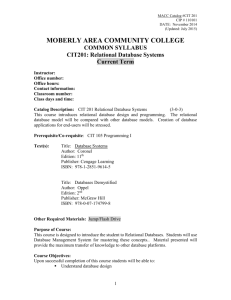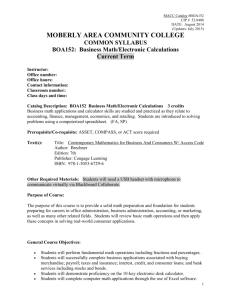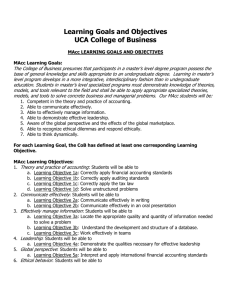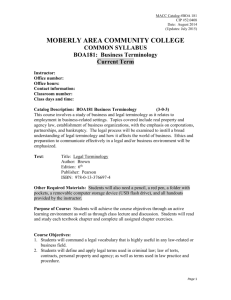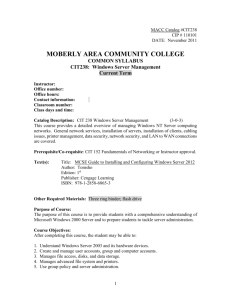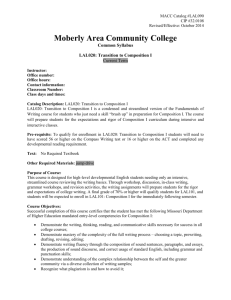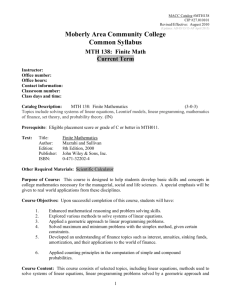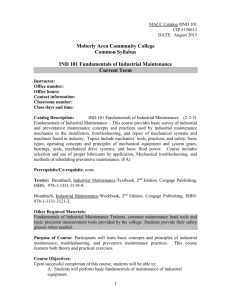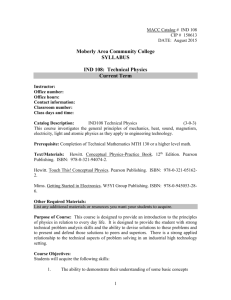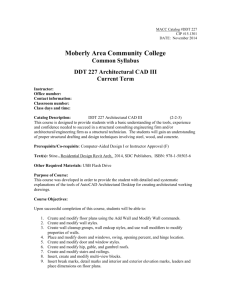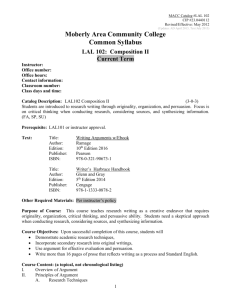CIT 252 Advanced Routers and Switches
advertisement
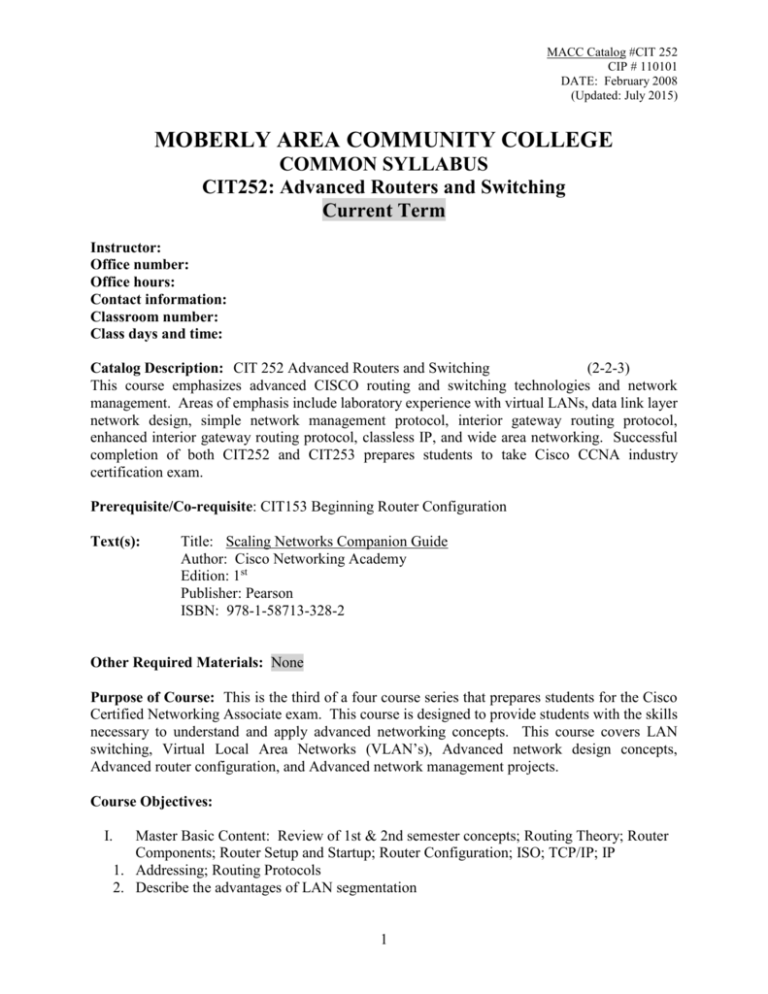
MACC Catalog #CIT 252 CIP # 110101 DATE: February 2008 (Updated: July 2015) MOBERLY AREA COMMUNITY COLLEGE COMMON SYLLABUS CIT252: Advanced Routers and Switching Current Term Instructor: Office number: Office hours: Contact information: Classroom number: Class days and time: Catalog Description: CIT 252 Advanced Routers and Switching (2-2-3) This course emphasizes advanced CISCO routing and switching technologies and network management. Areas of emphasis include laboratory experience with virtual LANs, data link layer network design, simple network management protocol, interior gateway routing protocol, enhanced interior gateway routing protocol, classless IP, and wide area networking. Successful completion of both CIT252 and CIT253 prepares students to take Cisco CCNA industry certification exam. Prerequisite/Co-requisite: CIT153 Beginning Router Configuration Text(s): Title: Scaling Networks Companion Guide Author: Cisco Networking Academy Edition: 1st Publisher: Pearson ISBN: 978-1-58713-328-2 Other Required Materials: None Purpose of Course: This is the third of a four course series that prepares students for the Cisco Certified Networking Associate exam. This course is designed to provide students with the skills necessary to understand and apply advanced networking concepts. This course covers LAN switching, Virtual Local Area Networks (VLAN’s), Advanced network design concepts, Advanced router configuration, and Advanced network management projects. Course Objectives: I. Master Basic Content: Review of 1st & 2nd semester concepts; Routing Theory; Router Components; Router Setup and Startup; Router Configuration; ISO; TCP/IP; IP 1. Addressing; Routing Protocols 2. Describe the advantages of LAN segmentation 1 MACC Catalog #CIT 252 CIP # 110101 DATE: February 2008 (Updated: July 2015) 3. Describe LAN segmentation using bridges, switches, and routers 4. Name and describe two switching methods 5. Distinguish between cut-through and store and forward LAN switching 6. Describe the benefits of virtual LANs 7. Describe full and half duplex Ethernet operation 8. Describe network congestion problem in Ethernet networks 9. Describe the features and benefits of Fast Ethernet 10. Describe the guidelines and distance limitations of Fast Ethernet 11. Monitor Novell IPX operation on the router 12. List the required IPX address and encapsulation type 13. Configure IPX access lists and SAP filters to control basic Novell traffic 14. Enable to Novell IPX protocol and configure interfaces II. Master Documentation Skills: maintain an engineering journal; cable management techniques III. Master People Skills: work in engineering teams, self and project management, oral exams, presentations IV. Achieve Awareness and Access: basic technological literacy; awareness of IT careers; preparation for 2 and 4 year, EET and CIS programs; access to well paying, learning oriented jobs; ability to design, install and maintain internet works. 1. Recursion Course Content: I. II. III. IV. V. Basic Content LAN Documentation Skills People Skills Awareness and Access Statement to Connect Course with Technical Program Outcome Statement: In compliance with MACC’s General Education outcomes, the student who successfully completes this course will be able to: I. Demonstrate effective written and oral communication; Assessment of Student Learning: Grading: Grades are determined on the basis of examination scores and written homework assignments and class participation. Counseling with the student when the need arises to evaluate his/her efforts and/or weaknesses also plays a part in grading. The grading scale is: A = 90%, B = 80%, C = 70%, D = 60%. Examination & Grading Policy: Unit/Weekly Exams Labs & Projects On-Line Final Exam 30% 30% 40% 2 MACC Catalog #CIT 252 CIP # 110101 DATE: February 2008 (Updated: July 2015) Instructor Policies: Academic Dishonesty: MACC board policy is as follows: “Academic dishonesty by students damages institutional credibility and unfairly jeopardizes honest students; therefore, it will not be tolerated in any form.” Forms of academic dishonesty include but are not limited to the following: violations of copyright law, plagiarism, fabrication, cheating, collusion, and other academic misconduct. Incidents of dishonesty regarding assignments, examinations, classroom/laboratory activities, and/or the submission of misleading or false information to the College will be treated seriously. The procedure for handling academic dishonesty is outlined in the Student Handbook (Policy Handbook M.010). In cases of alleged academic dishonesty, the burden of proof is on the student, not on the instructor. Attendance: Any student who misses two consecutive weeks of class during a regular sixteenweek semester or the equivalent proportion of class time during a shorter session will be dropped from the class by the instructor unless acceptable justification is supplied. Additionally, any student who misses more than one-fourth of the entire number of in-seat class meetings in a regular 16-week semester or the equivalent proportion of class time during a shorter session, may be dropped from that class by the instructor if, in the opinion of the instructor, the student does not have reasonable opportunity to succeed in the class. A student’s attendance rate will be calculated based upon the first day of the semester (not the student’s date of enrollment in the course). Student attendance must be defined in a different manner for online, hybrid, and virtual courses. Student attendance in these courses is defined as active participation in the course. Online, hybrid, and virtual courses will, at a minimum, have weekly mechanisms for student participation, such as any or all of the following methods: a. Completion of quizzes or exams b. Submission of assignments c. Participation in threaded discussions d. Communication with the instructor A student who does not participate in an online, hybrid, or virtual course for two consecutive weeks will be dropped by the instructor unless acceptable justification is supplied. As with ground courses, a student’s attendance rate in online courses will also be calculated based upon the first day of the semester. If a student does not demonstrate active participation in the online course within the first two weeks (or the equivalent proportion of class time during a short session), the student will be dropped as “never attended.” Simply logging into an online class does not constitute active participation. Students should be aware that their dropping a course and their last date of attendance in the course may impact their financial aid. 3 MACC Catalog #CIT 252 CIP # 110101 DATE: February 2008 (Updated: July 2015) Tardiness: per instructor’s policy Make-up and late work: per instructor’s policy Extra-Credit: per instructor’s policy Schedule of Student Assignment and Activities: (per instructor) ADA Statement Students who have disabilities that qualify under the Americans with Disabilities Act may register for assistance through the Office of Access and ADA Services. Students are invited to contact the Access Office to confidentially discuss disability information, academic accommodations, appropriate documentation and procedures. For more information, please call either the Moberly office at (660) 263-4100 x 11240 or the Columbia office at (573) 2341067 x 12120, or visit our web page at http://www.macc.edu/index.php/services/access-office. Title IX Statement MACC maintains a strict policy prohibiting sexual misconduct in any form, including sexual harassment, sexual discrimination, and sexual violence. All MACC employees, including faculty members, are considered mandated reporters of sexual misconduct and as such are expected to contact the Title IX Coordinator when they become aware, in conversation or in writing, of an incident of sexual misconduct. For more information on this policy or to learn about support resources, please see http://www.macc.edu/sexual-misconduct-policy or contact Dr. Jackie Fischer, MACC’s Title IX Coordinator, at 660-263-4110, ext. 11236 or jackief@macc.edu. 4
